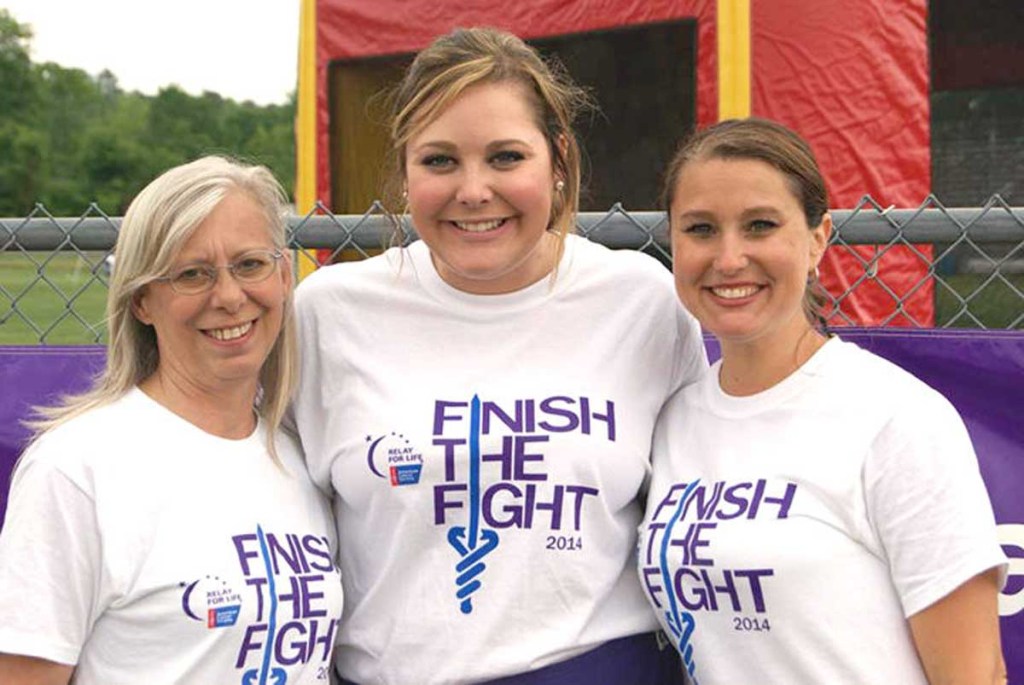When the fight becomes personal
Published 4:30 pm Thursday, September 10, 2015

- Becky Hogan was a regular volunteer with Relay for Life in St. Clair County before she was diagnosed with colon cancer in 2014. Now cancer-free, she continues to support the cause.Pictured from left are Hogan, Malinda Williams of the American Cancer Society, and volunteer Michelle Parker. Photo courtesy of Becky Hogan.
September Cancer Awareness: Knowing your risk of colon cancer
Becky Hogan is no stranger to the topic of cancer. Both of her grandfathers passed away from the disease, and going through those losses inspired her to help others find a cure.
She began volunteering with Relay for Life in 1996 and has continued that tradition annually after moving to Odenville and beginning work in Leeds. Eighteen years later, in 2014, Hogan committed to being event leader and has been assigned to instruct other leaders in the organization.
“I don’t want anyone to have to hear that they have cancer ever again,” Hogan said.
But being closely involved in finding a cure did not prepare her for her own diagnosis. In January 2014, it became a personal battle.
After a routine checkup with her OBGYN, Hogan was informed that she had stage-3 colon cancer.
“I was surrounded by survivors and those battling, but I never thought I would have cancer myself,” Hogan said.
Within a month of her diagnosis, she underwent surgery to remove the tumor. Following that, she endured nine months of chemotherapy.
“The toll that treatment takes on your body is unexplainable,” Hogan said. She received chemo treatments every other week.
“Going through that, you crave normalcy. I kept working in between my chemo weeks to keep a balance,” Hogan said.
She did more than just continue working. She continued working with Relay to help find the cure for a disease she was now fighting.
Relay for Life 2014 was an emotional experience for the then-chemo patient. That didn’t stop her from planning and attending the event, though.
“That year was different for me. It became so personal. I scheduled Relay for a week I wasn’t getting chemo so I could participate,” Hogan said. “It can be easy to slip into depression, but you have to find some humor or bright side to it.”
During her treatments, because of the type of chemotherapy she was going through, Hogan was not allowed to consume cold food or drink.
“The other patients and I were together and when it was time to stop cold consumption, we would all make coffee together,” Hogan recalls. “It wasn’t much but having that sort of tradition helped make light of the difficult treatments, and it was something we could all do together,” Hogan said.
In addition to the support of her loved ones, neighbors, and coworkers, Hogan had the American Cancer Society as a resource. Working with the organization throughout the years helped her understand cancer and gave her people to contact who were a wealth of knowledge.
“Having that in my back pocket helped me stay positive and not panic while I was going through my diagnosis and treatment,” Hogan said.
Over the months of chemotherapy, Hogan was able to use her knowledge to provide others with emotional support during their own battles. Because of the resources she had, she would keep in touch with people going through treatment, and she said she sought to be an encouragement to them. “By doing that, I kept my mind off my own disease and that helped keep me positive,” Hogan said.
After almost a year of treatment, in September of 2014, Hogan was declared cancer free.
“I’m going for my one-year checkup this week, and I’m so excited to be able to say that,” she said.
Looking back on her journey, Hogan advises everyone to be screened regularly.
“If I would have been screened, I could have caught it before it was stage 3,” she said. “That early discovery could have saved me from going through chemo.”
Since becoming cancer-free, her work with Relay for Life has taken on a new level of meaning.
“I used to sympathize with those going through cancer,” Hogan said. “Now I can tell them I know what it’s like and I can relate to them like I never could before. Going through my own storm has helped me walk with others through theirs.”
Colon cancer is a disease in which malignant (cancer) cells form in the tissues of the colon. Health history can affect the risk of developing colon cancer.
Symptoms
• Weight loss for no known reason
• Feeling very tired
• Vomiting
• Frequent bloating, fullness, or cramps
Increased Risk Factors
• Age
• Family history of colon cancer
• Personal history
• Alcohol
Detection
People with an average risk of colon cancer should be screened beginning at age 50. But people with an increased risk, such as those with a family history of cancer, should consider screening sooner.
Several screening options exist. Talk about the options with your physician, and together you can make the decision on which tests are best for you.
Prevention
You can take steps to reduce your risk of colon cancer by making changes in your everyday life. Take steps to:
• Eat a variety of fruits, vegetables and whole grains.
• Drink alcohol in moderation, if at all.
• Stop smoking.
• Exercise most days of the week.
• Maintain a healthy weight.
From cancer.gov


